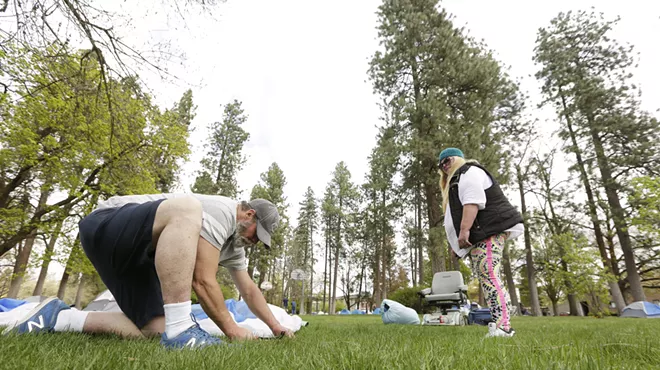On Monday morning, City Councilman Mike Fagan says, he came to work to find an envelope with his name misspelled on the outside, and two documents on the inside. One document was the articles of incorporation listing Jason Green as the co-founder for Jewels Helping Hands, the organization the city chose to lead its newest warming shelter.
The other was a 2015 press release from the FBI, detailing Green's part in a 2009-10 embezzlement scheme. According to the FBI, Green and a friend stole hundreds of thousands of dollars from Green's employer, U.S. Foodservice, including by approving expenditures for work that was never done and falsifying accounting records.
In light of the revelation, Fagan argued the decision to award the warming shelter contract to Jewels Helping Hands — instead of the much more experienced Salvation Army — was particularly suspicious.
"My heart tells me the council failed, and the administration failed also," Fagan says.
But Green tells the Inlander that the reason why Jewels was awarded the contract was simple: Jewels promised they could run the warming center for much less money and get started much faster. Green says he will be doing accounting work for Jewels' with the city contract, including processing receipts and payroll, but also says there are multiple levels of scrutiny his accounting will go through.
"Our financials go out to seven other board members" as well as the Smith-Barbieri Foundation, Green says. The organization will have to submit receipts to the city before it's approved. And if the city lets him, he says he plans to release the financials publicly as well.
"I work with complete transparency because I do not want to be doubted and I know my past will always haunt me," Green writes on Facebook, noting he spent 21 months in prison and paid back the money in restitution.
Green says the issue didn't come up during his discussions about the city running the warming center. But City Council President Ben Stuckart says he was well aware of Green's past.
"I've known that since they've started working in the community," Stuckart says. "He's been honest and open about his past."
Stuckart stresses the importance of "banning the box" — preventing employers from asking about felonies early in the interview process — and points out that Green, in his day job, is a controller handling $1 million for 11 restaurants.
"His current employer trusts him," Stuckart says. "I think this is a last-minute smear campaign."




























